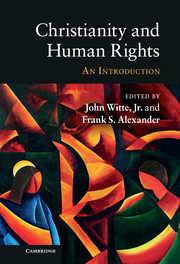Book contents
- Frontmatter
- Contents
- List of contributors
- Acknowledgements
- The first word: to be human is to be free
- Introduction
- FOUNDATIONS AND DEVELOPMENTS OF HUMAN RIGHTS
- CHRISTIANITY AND THE MODERN HUMAN RIGHTS FRAMEWORK
- 9 The human rights system
- 10 The image of God: rights, reason, and order
- 11 Religion and equality
- 12 Proselytism and human rights
- 13 Religious liberty, church autonomy, and the structure of freedom
- 14 Christianity and the rights of children: an integrative view
- 15 Christianity and the rights of women
- 16 Christianity, human rights, and a theology that touches the ground
- 17 A right to clean water
- The final word: can Christianity contribute to a global civil religion?
- Biblical index
- Index
17 - A right to clean water
Published online by Cambridge University Press: 05 June 2012
- Frontmatter
- Contents
- List of contributors
- Acknowledgements
- The first word: to be human is to be free
- Introduction
- FOUNDATIONS AND DEVELOPMENTS OF HUMAN RIGHTS
- CHRISTIANITY AND THE MODERN HUMAN RIGHTS FRAMEWORK
- 9 The human rights system
- 10 The image of God: rights, reason, and order
- 11 Religion and equality
- 12 Proselytism and human rights
- 13 Religious liberty, church autonomy, and the structure of freedom
- 14 Christianity and the rights of children: an integrative view
- 15 Christianity and the rights of women
- 16 Christianity, human rights, and a theology that touches the ground
- 17 A right to clean water
- The final word: can Christianity contribute to a global civil religion?
- Biblical index
- Index
Summary
Environmental law has developed apart from ideas of rights. It emerged from the common law of property and torts, exploded into a multitude of statutes, and has expanded into international law. Only recently have notions of human rights related to the environment gained traction, and their impact remains modest.
Environmental law has also developed apart from Christian teaching. Indeed, one famous essay blamed Christianity for the world's worsening environmental problems. Since then, numerous Christian writers have articulated thoughtful expositions of the lessons of biblical and Christian teaching regarding care for the world that God created. These writings, though, devote little attention to the relationship of Christian environmental teaching to public policy or law generally, or to claims of environmental rights in particular.
In this chapter, I use the idea of a right to clean water to illustrate the role that rights play in environmental protection. Christianity and other value systems agree that clean water is perhaps the most fundamental environmental need for humans and other creatures alike. Both the law and voluntary organizations – including many Christian relief organizations – work aggressively to provide clean water throughout the world. They do so, however, with scant assistance from the legal construct of rights. Little is lost from such reliance upon a legal framework that operates outside the context of human rights, and Christian teaching has much less to say about the possible value of adding rights claims to environmental law debates than it does about the need to make environmental progress, however we do so.
- Type
- Chapter
- Information
- Christianity and Human RightsAn Introduction, pp. 335 - 350Publisher: Cambridge University PressPrint publication year: 2010



